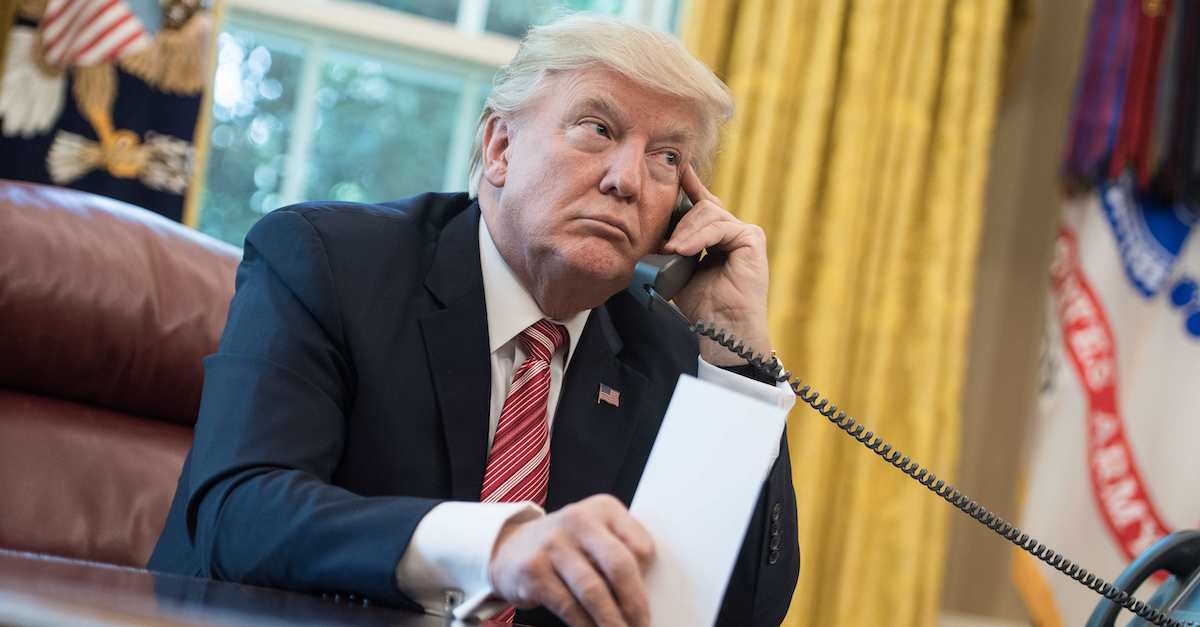
In a new lawsuit released Monday, attorneys representing President Donald Trump asked a federal judge to overturn Georgia’s election results based on a series of misleading and outright false assertions that appear to have provided the foundation for the president’s now-infamous call with Georgia Secretary of State Brad Raffensperger and others.
Throughout the call, Trump was belligerent and delusional, falsely insisting that he won the state “by hundreds of thousands of votes” and threatening Raffensperger and the secretary’s General Counsel Ryan Germany with possible criminal penalties, saying they were taking a “big risk” by defying him.
The complaint—filed in U.S. District Court for the Northern District of Georgia last week against Raffensperger and Gov. Brian Kemp—alleged that the state certified “illegal votes” and seeks a court order directing the officials to “de-certify the election” and to allow Congress to choose a new slate of electors. The suit was not entered on the court’s docket until Monday morning because it was filed just before a long holiday weekend.
Aside from the chimerical relief requested (there is no mechanism for a federal court to decertify state elections), Trump’s claims rely on egregious misinterpretations of fact and law, many of which are undercut by material cited in the lawsuit.
For example, the complaint’s opening sentence alleges that the state’s election was “conducted contrary to the ‘Manner’ for choosing presidential electors that had been established by the Legislature” and resulted in the “certification of illegal votes.” However, a footnote supporting that claim cites to a Facebook post from Georgia Voting Implementation Manager Gabriel Sterling—a Republican and member of the Secretary of State’s Office—filing a challenge to stop a single illegal vote from being cast by a woman who allegedly used his home address to vote absentee. That is hardly supporting evidence for claiming an entire legislative scheme was cast aside by the state as a whole.
The complaint then lists a litany of other groups such as “deceased” and “underage” individuals who allegedly voted illegally, but it cites only to “affidavits and experts opinions” based on publicly available information. It then notes that “Plaintiff [Trump] has not sworn to any facts under oath for which he does not have personal knowledge or belief.”
State election officials have confirmed that exactly two ballots were cast on behalf of deceased individuals in the election.
Trump’s attorneys further asserted that election officials “failed to verify the signatures on absentee ballots” as required by state law—despite having conceded that the verification process had been determined and mandated in March. They then mischaracterized the “Settlement Contract” establishing those processes and claimed officials may have knowingly implemented a set of unconstitutional procedures.
“The Settlement Contract specifically provides that the parties take no position on the constitutionality of that agreement, yet Raffensperger implemented the agreement fully throughout the entire 2020 general election process,” the suit stated.
However, as attorney Akiva Cohen pointed out, that language in the agreement is simply a standard “we’re settling without admitting wrongdoing” provision being misrepresented.
“Words can’t express how bad it is to file THAT claim in a federal court document,” Cohen wrote. “There’s no conceivable good faith basis for it; no attorney could have misread it. Every time I think the bar has dropped as far as it can possibly go, I underestimate their ability to keep digging.”
The suit also rehashes a number of debunked conspiracy theories that Trump echoed in his Saturday call with Raffensperger. During that call, Trump tried to coerce the secretary to “find” enough votes to swing the election in his favor.
According to the lawsuit, “perhaps the most egregious violation” occurred when Fulton County election officials “falsely informed [election] observers” that they were done for the evening, only to “remove suitcases full of ballots from under a table where they had been hidden, and processed those ballots without open viewing by the public.”
But an official investigation into those allegations has already taken place, revealing “there were no mystery ballots that were brought in from an unknown location and hidden under tables as has been reported by some.”
To cap things off, Trump attorney Kurt Hilbert tried to conclude the complaint on a patriotic high note unlike any standard lawsuit’s signature block.
“Respectfully submitted and GOD BLESS AMERICA, this 31th [sic] day of December 2020,” he wrote before signing his name.
Read the full complaint below.
Trump v. Kemp by Law&Crime on Scribd
[image via NICHOLAS KAMM/AFP/Getty Images]